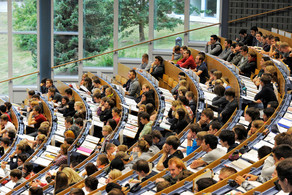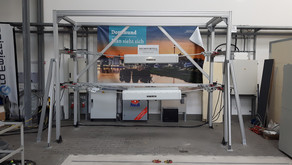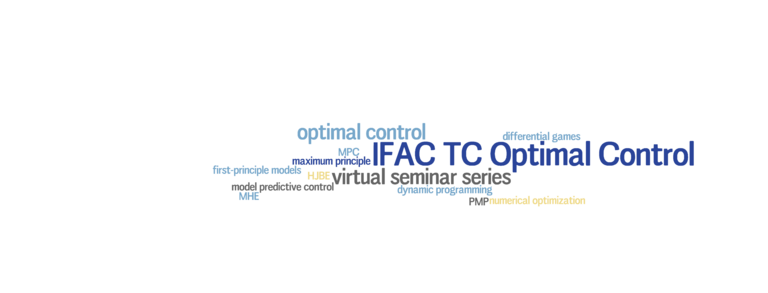Trends in software and tools for optimal and predictive control
Video recordings: https://www.youtube.com/watch?v=aONLMyVSKBs
Date: May 18th 2022, 15h00 - 17h30 (CEST)
Location: Zoom; no registration is required; https://tu-dortmund.zoom.us/j/96138449039?pwd=Wk9jeXBtZm5KZmkyTEZZNVpPMlM2UT09; Webinar-ID: 961 3844 9039; Passcode: 182424
Organizers:
- Timm Faulwasser, TU Dortmund, Germany; timm.faulwasser@tu-dortmund.de
- Thulasi Mylvaganam, Imperial College London, UK; t.mylvaganam@imperial.ac.uk
Schedule:
| Time (CEST) | Title and Speaker | |
| 15h00 | Welcome | |
| 15h05 | Distributed optimization and control with ALADIN Boris Houska, ShanghaiTech University, China | |
| 15h50 | Embedded optimization and MPC for next-gen controls in industrial production Gionata Cimini, ODYS S.r.l., Italy | |
| 16h35 | Operator splitting methods and software for convex optimization Paul Goulart, University of Oxford, UK |
Speaker: Boris Houska (ShanghaiTech University)
Title: Distributed optimization and control with ALADIN
Abstract:
This talk is about recent developments in the field of distributed optimization algorithm development with applications in optimal- and model predictive control (MPC). Our focus is on novel variants of the Augmented Lagrangian based Alternating Direction Inexact Newton method (ALADIN). In the first part of the talk, we explain how ALADIN can be used to synthesize sparse QP solvers for large-scale linear-quadratic optimal control by combining ideas from augmented Lagrangian methods, sequential quadratic programming, as well as barrier or interior point methods. It is demonstrated that ALADIN based real-time QP solvers can be implemented with a few lines of code yet arriving at a solver that can compete with mature open-source and commercial QP solvers in terms of both run-time as well as numerical accuracy. Moreover, in the second part of the talk, it is discussed why this observation could have far reaching consequences on the future of algorithm and software development in the field of large-scale optimization and MPC.
Speaker: Gionata Cimini (ODYS S.r.l., Italy)
Title: Embedded optimization and MPC for next-gen controls in industrial production
Abstract:
Industrial applications of embedded optimization and Model Predictive Control (MPC) are rapidly growing in number and complexity across various domains, from automotive and aerospace to robotics and power systems. A successful embedded implementation requires software designed to focus simultaneously on execution speed, reliability, and light memory footprint. The development cycle also needs validation procedures that can quickly provide feedback on memory and throughput feasibility for the selected hardware. In this talk, we overview optimization algorithms and software tools that have been critical enablers for using real-time linear and nonlinear MPC in mass production. The first step towards production is to solve Quadratic Programming (QP) problems efficiently and reliably, on resource-constrained hardware and often in single precision arithmetics. We show performance metrics collected on embedded applications running ODYS QP Solver and benchmarks of different QP solvers. Then we focus on mathematical programming problems arising from MPC formulations. We provide examples of control problems solved with the "ODYS Embedded MPC" software package and compare them to other predictive control frameworks. Lastly, we discuss learning-based techniques that enable the coupling of data-driven and physics-based modeling and show tools for learning small-scale neural networks and integrating them efficiently as prediction models in MPC. All the algorithms presented are coded in library-free C code, and in the talk, we will cover interfaces with MATLAB, Simulink, and Python.
Speaker: Paul Goulart (University of Oxford)
Title: Operator splitting methods and software for convex optimization
Abstract:
Convex optimization problems appear in a huge range of applications in engineering, operations research, finance and other areas. Although numerical methods for convex optimization have been the subject of extensive research for decades, modern applications call for new techniques and software tools. At one extreme, real-time applications rely on fast numerical computation using embedded devices with limited capability, e.g. in control and robotics. At the other, applications exploiting the availability of big data demand the solution to very large scale optimization problems, e.g. in machine learning and in planning for the transportation and energy sectors.
This talk will present a general purpose solution method for convex optimization problems with quadratic objectives based on the alternating direction method of multipliers (ADMM). We employ a novel operator splitting technique that requires the solution of a quasi-definite linear system with the same coefficient matrix in each iteration. Our algorithm is very robust, highly scalable, and places no requirements on the problem data such as positive definiteness of the objective function or linear independence of the constraint functions. For large-scale semidefinite programs (SDPs), we also employ decomposition strategies based on identifying chordal sparsity in the problem data to split large constraints into multiple smaller ones.
We have implemented this method in the open-source C language solver OSQP for quadratic programs and in the Julia language solver COSMO for general conic problems. These solvers are free and open-source, significantly faster than competing off-the-shelf commercial solvers for many problems, and are widely used in the finance, engineering, robotics and research sectors worldwide.
This is the third event of the Virtual Seminar series of the IFAC TC on Optimal Control. The series consists of two events per year, with each event dedicated to a specific area within optimal control and including talks by distinguished members of our community, as well as discussion sessions.
For further details please contact
- Thulasi Mylvaganam, Imperial College London, UK; t.mylvaganam@imperial.ac.uk
- Timm Faulwasser, TU Dortmund, Germany; timm.faulwasser@tu-dortmund.de





